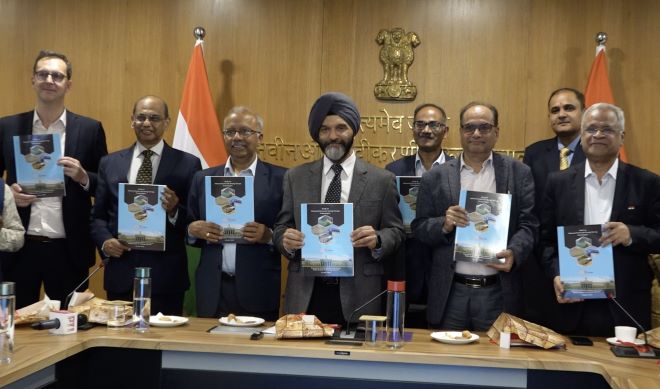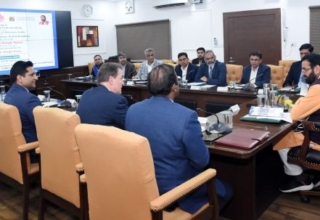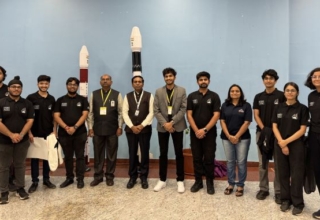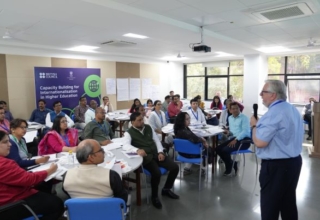
In a world where almost, everything is dependent on energy sector, role of energy storage and the way it is impacting ancillary services, imports, tariff structures and indigenous capabilities for an emerging and large economy like India, has been always immense but lacked a comprehensive understanding backed by research. That gap has been filled up now thanks to a study titled “Advanced Grid-Scale Energy Storage Technologies,” conducted by a team of IIT Roorkee under the leadership of Prof Arun Kumar. That study was released in the form of a report by Secretary, Ministry of New and Renewable Energy (MNRE), Shri BS Bhalla in presence of Dr Ajay Mathur, Director General, International Solar Alliance and Prof KK Pant Director, IIT Roorkee, at Atal Akshaya Urja Bhawan, MNRE, New Delhi on Nov. 29, 2023.
Saying there is a need for proactive policy measures, regulatory frameworks, and strategic investments to propel the adoption of advanced grid-scale energy storage technologies, the makes recommendations that would help policy makers. The study, a collaborative effort between MNRE and IIT Roorkee, sets the stage for informed decision-making and transformative initiatives in India’s renewable energy landscape.
Prof. KK Pant, Director, IIT Roorkee, emphasizing the report’s role in shaping policies for the accelerated adoption of clean energy technologies in India said, “This study reinforces our commitment at IIT Roorkee towards nation-building through focused India-centric research and technical education. The report is poised to play a crucial role in shaping policies for the accelerated adoption of clean energy technologies at scale in India, offering a strategic roadmap for a sustainable and resilient energy future.”
This study explores diverse grid scale energy storage solutions crucial for India’s sustainable energy future and addresses critical aspects of the power sector, emphasizing the need for a resilient and sustainable energy landscape in India. It puts forth actionable recommendations to enhance renewable energy integration and improve grid-scale energy storage efficiency, marking a significant step towards achieving India’s renewable energy goals.
Specific directives are proposed to amplify the role of energy storage targets for each licensee. Attractive tariffs are recommended to incentivize ancillary services and frequency regulation. Additionally, the study proposes the introduction of a storage purchase obligation for relevant utilities to bolster energy storage adoption further.
Regulators are advised to review and revise Grid Codes to promote greater flexibility in power generation, accommodating the evolving landscape of energy storage technologies. Clear and distinct energy storage ownership remuneration rules are recommended by regulators, aligning with existing frameworks for transmission, generation, and distribution companies. These rules are envisaged to address diverse purposes and ensure a level playing field.
Techno-Economic Analysis of Grid-Scale Storage Technologies: Five prospective grid-scale storage technologies—pumped storage, Li-ion batteries, vanadium redox flow batteries, compressed air energy storage, and thermal energy storage—have undergone comprehensive life cycle techno-economic analysis. The analysis reveals that pumped storage stands out as the most cost-effective option, with a levelized cost of storage at INR 3.91/kWh without cost of pumping power and global warming potential of 0.12 kg CO2 eq /kWh.
Comparative Advantage of Pumped Storage: The levelized cost of storage for pumped storage 40% of cost to lithium-ion batteries. The CO2 emissions associated with pumped storage have been estimated to be 25% lesser as compared to lithium-ion batteries.
Import Dependency and Made-in-India Content: Presently, none of the energy storage technologies exhibit 100% made-in-India content, with significant variations in import percentages. Pumped storage (PSP) leads in terms of domestic content with over 90%, while acknowledging some equipment imports. Other technologies, especially batteries, necessitate raw material imports, highlighting the need for strategic considerations in the pursuit of self-reliance.
Dr. Ajay Mathur, Director General, International Solar Alliance also an Alumnus of IIT Roorkee, acknowledged India’s global leadership in renewable energy adoption and emphasized the critical role of energy storage in grid stability and RE deployment. He commended the report, stating, “India has emerged as a global leader in adopting renewable energy technologies at scale. With the rapid adoption of these technologies, energy storage becomes critical for grid stability. This report is a welcome and apt effort in that context, offering valuable insights for the sustainable advancement of our energy landscape.”
MAKP Singh, Member Hydro Central Electricity Authority, Rajnath Ram, Advisor Energy Niti Aayog, and SR Narashimhan, CMD, India Grid Controller, alongside senior officials from the Central Electricity Authority (CEA) and renewable energy developers attended the release event.










